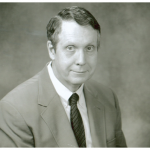Daniel E. Furst, MD, the Carl M. Pearson professor of rheumatology, Department of Medicine, Division of Rheumatology, at the David Geffen School of Medicine at UCLA has collaborated with Hal Paulus since the early 1970s. He recalls participating during his fellowship in Dr. Paulus’ seminal studies on TDD in RA patients (“as a gopher,” he says). As noted earlier, those studies which helped to establish the importance of the immune system response in RA. “He has done some exceptional things,” says Dr. Furst. He values the high standard that Dr. Paulus set, of being rigorous about clinical trials. And, “on a clinical basis,” adds Dr. Furst, “he just has an incredible feel. He is the one who taught me to see, when you walk in the room, when a patient is sick. He has a very logical approach to differential diagnosis.”
Early in their affiliation, Drs. Furst and Paulus found their interests aligned when it came to pharmacological studies. After his fellowship at UCLA, Dr. Furst then proceeded to the University of California, San Francisco—on the advice of Dr. Paulus—to acquire additional fellowship training in clinical pharmacology. The two collaborated in the development of FDA guidelines for studying DMARDs in RA. And, it was Dr. Paulus who recruited Dr. Furst back to UCLA from Virginia Mason Institute in Seattle as the first Carl M. Pearson professor of rheumatology.
Dedicated to the Greater Good
Dr. Paulus is known for his singular dedication to scientific rigor, often manifested in a generous yet reserved manner. The background work for the composite index for estimating improvement in individual RA patients, Dr. Paulus noted, was the series of foundational studies done by the Cooperating Clinics in the 1960s through the 1980s evaluating drugs such as cyclophosphamide, azathioprine, and methotrexate for use as DMARDs. Even though the resulting proposed composite index is generally known as “the Paulus criteria,” Dr. Paulus does not label it as such in conversation, and credits John Ward’s leadership of the Cooperative Systematic Studies of Rheumatic Diseases group for moving the work forward.5
Dr. Ashman recalls that Dr. Paulus “had a knack for choosing questions to investigate that would have a practical impact on practice. I suspect that is why he continues to be a collaborator valued by clinical investigators all over the world, as his recent bibliography demonstrates.”
The Paulus criteria have been used by various investigators (such as Maini et al in their first studies of infliximab, the anti–tumor necrosis factor agent6) to evaluate the effectiveness of biological drugs for RA. In 1995, an international committee effort led by David Felson, MD, MPH, professor of medicine and epidemiology at Boston University School of Medicine, and principal investigator of the NIH-funded Boston University Multidisciplinary Clinical Research Center, refined the index, resulting in the ACR Definition of Improvement in RA.7

